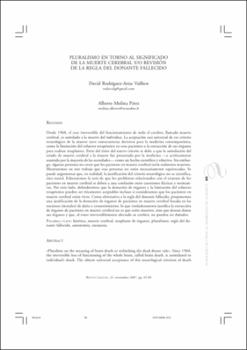Pluralismo en torno al significado de la muerte cerebral y/o revisión de la regla del donante fallecido
Date
2007Abstract
Desde 1968, el cese irreversible del funcionamiento de todo el cerebro, llamado muerte cerebral, es asimilado a la muerte del individuo. La aceptación casi universal de ese criterio neurológico de la muerte tuvo consecuencias decisivas para la medicina contemporánea, como la limitación del esfuerzo terapéutico en esos pacientes o la extracción de sus órganos para realizar trasplantes. Parte del éxito del nuevo criterio se debe a que la asimilación del estado de muerte cerebral a la muerte fue presentada por la medicina —y acríticamente asumida por la mayoría de las sociedades— como un hecho científico y objetivo. Sin embargo, algunas personas no creen que los pacientes en muerte cerebral estén realmente muertos. Mostraremos en este trabajo que esas personas no están necesariamente equivocadas. Se puede argumentar que, en realidad, la justificación del criterio neurológico no es científica, sino moral. Esbozaremos la tesis de que los problemas relacionados con el estatuto de los pacientes en muerte cerebral se deben a una confusión entre cuestiones fácticas y normativas. Por otro lado, defenderemos que la donación de órganos y la limitación del esfuerzo terapéutico pueden ser éticamente aceptables incluso si consideramos que los pacientes en muerte cerebral están vivos. Como alternativa a la regla del donante fallecido, proponemos una justificación de la donación de órganos de pacientes en muerte cerebral basada en las nociones (morales) de daño y consentimiento: lo que verdaderamente justifica la extracción de órganos de pacientes en muerte cerebral no es que estén muertos, sino que desean donar
sus órganos y que, al tener irreversiblemente afectado su cerebro, no pueden ser dañados. Since 1968,
the irreversible loss of functioning of the whole brain, called brain death, is assimilated to
individual’s death. The almost universal acceptance of this neurological criterion of death had decisive consequences for the contemporary medicine, such as the withdrawal of
mechanical ventilation in these patients and organ retrieval for transplantation. The new
criterion was succesfully accepted in part because the assimilation of brain death state to
death was presented by medicine —and acritically assumed by most of societies— as a
scientific and objective fact. Nevertheless, many people do not think that the patients suffering
brain death are actually dead. We show here that those people are not necessarily wrong. It
can be argued that, in fact, the justification of the neurological criterion is not scientific but
moral. We outline the thesis that the problem surrounding the vital status of brain dead
patients is due to a confusion between factual and normative questions. Furthermore, we
claim that the donation of organs and the withdrawal of life-support could be ethically
acceptable even if the patients suffering brain death are considered as alive. As an alternative
to the dead donor rule, we propose a justification for organ donation of brain-dead patients
based on the (moral) concepts of harm and consent: what truly justifies the procurement of
organs on those patients is not that they are dead, but that they wish to donate their organs
and that, since they have irreversibly lost their brain, they cannot be harmed.





